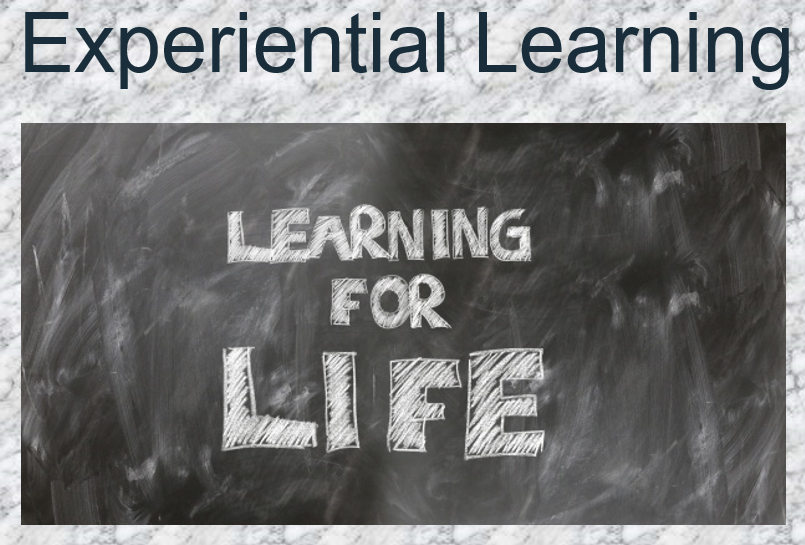
Experiential learning is nothing more than learning by doing. It is the art of practicing new knowledge until it is well integrated into our personal and/or professional lives.
So how is experiential learning different than hands-on learning? Experiential learning asks the learner to dedicate some time to reflecting on the learning experience. Experiential learning is, in essence, learning through hands-on with reflection on doing.
Experiential learning first appeared in the 1970s by David Kolb who is also the author and creator of the Kolb Learning Theory and the Experiential Learning Cycle. Kolb used the works of psychologists and theorists such as John Dewey to build his theory.
The foundation of experiential learning posits that individuals learn best through experiences while the least effective means of learning come through the memorizing facts, reading or other passive learning modalities. Kolb suggests that there are four steps within his experiential learning model: experiencing, reflecting, thinking and acting.
A simple example of experiential learning: Instead of studying the laws of physics, the student could practice them. Did you ever build a contraption in high school out of straws to protect an egg that would be dropped from a high place? This is an example of experiential learning when coupled with the challenge of recording and reflecting on the experience.
The principles of experiential learning can be used in the classroom but also in the pursuit of self-directed learning. An individual does NOT have to be in a classroom or a formal, educational situation to reap the benefits of experiential learning. The most important and foundational piece to remember is to build upon existing knowledge – recalling the zone of proximal development.
Benefits of Experiential Learning
There are many benefits of experiential learning. The greatest benefit is the higher retention of knowledge and information. Individuals are more likely to use the knowledge later.
Individuals are encouraged to be more creative in their learning as they seek for ways to apply this knowledge and information.
Individuals tend to retain more knowledge through experiential learning than through more passive means.
Individuals develop essential skills of reflection in learning. This leads to higher critical thinking skills as explained by Maslow in his hierarchy of learning.
Individuals learn from mistakes. Failures become valuable learning experiences instead of pushed into the dichotomy of right/wrong, black/white.
Individuals are noted to have more positive learning experiences which then leads to further positive learning experiences. Individuals who participate in experiential learning build a foundation to develop the attributes of a self-directed learner.
Drawbacks of Experiential Learning
One of the greatest drawbacks can be the amount of time needed to process knowledge through an experiential learning experience.
Another drawback is the time in planning and executing. This is more than the point above as it requires a guide, mentor, instructor or learner to dedicate time to the experiential learning experience in the realm of goal setting and planning for the learning.
Some critics claim there is too much emphasis put on the goals and planning than on the experience itself.
Other critics worry that the reflection process allows the learner too much leniency in determining their learning experience. There may be a lack of direction from a mentor or subject matter expert. This lack of direction can lead the learner to go down wrong paths in their learning and even to result in incorrect conclusions.
Overall, experiential learning has value to the learner. It engages the learner. It is NOT a passive experience where an individual is considered to be nothing more than a receptacle of knowledge. It is a process to develop an individual to being capable of problem solving and application of precious information.
Sources:
Kolb, D.A. (1984). Experiential learning: experience as the source of learning and development. Englewood Cliffs, NJ: Prentice Hall.
Peterson, K. and Kolb, D. (2017). How You Learn Is How You Live: Using Nine Ways of Learning to Transform Your Life. Berrett-Koehler Publishers. Available: https://amzn.to/3bTQACp
Subscribe to our YouTube Channel by clicking here.

By Tracy Atkinson
Tracy Atkinson, mother of six, lives in the Southwest with her husband and spirited long-haired miniature dachshunds. She is a teacher, having taught elementary school to higher education, holding degrees in elementary education and an EDS in higher education. Her passion is researching, studying and investigating the attributes related to self-directed learners and learning styles. She has published several titles, including MBTI Learning Styles: A Practical Approach, The Art of Learning Journals, Calais: The Annals of the Hidden, Lemosa: The Annals of the Hidden, Book Two, Rachel’s 8 and Securing Your Tent. She is currently working on a non-fiction text exploring the attributes of self-directed learners: The Five Characteristics of Self-directed Learners.

Comments are closed